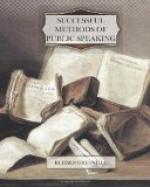5. For myself, I believe there is no limit fit to be assigned to it by the human mind, because I find at work everywhere, on both sides of the Atlantic, under various forms and degrees of restriction on the one hand, and under various degrees of motive and stimulus on the other, in these branches of the common race, the great principle of the freedom of human thought, and the respectability of individual character. I find everywhere an elevation of the character of man as man, an elevation of the individual as a component part of society. I find everywhere a rebuke of the idea that the many are made for the few, or that government is anything but an agency for mankind. And I care not beneath what zone, frozen, temperate, or torrid; I care not of what complexion, white, or brown; I care not under what circumstances of climate or cultivation—if I can find a race of men on an inhabited spot of earth whose general sentiment it is, and whose general feeling it is, that government is made for man—man, as a religious, moral, and social being—and not man for government, there I know that I shall find prosperity and happiness.—The Landing at Plymouth: DANIEL WEBSTER.
A Study in Patriotic Feeling
6. Friends, fellow citizens, free, prosperous, happy Americans! The men who did so much to make you are no more. The men who gave nothing to pleasure in youth, nothing to repose in age, but all to that country whose beloved name filled their hearts, as it does ours, with joy, can now do no more for us; nor we for them. But their memory remains, we will cherish it; their bright example remains, we will strive to imitate it; the fruit of their wise counsels and noble acts remains, we will gratefully enjoy it.
They have gone to the companions of their cares, of their dangers, and their toils. It is well with them. The treasures of America are now in heaven. How long the list of our good, and wise, and brave, assembled there! How few remain with us! There is our Washington; and those who followed him in their country’s confidence are now met together with him and all that illustrious company.—Adams and Jefferson: EDWARD EVERETT.
A Study in Clearness of Expression
7. I can not leave this life and character without selecting and dwelling a moment on one or two of his traits, or virtues, or felicities, a little longer. There is a collective impression made by the whole of an eminent person’s life, beyond, and other than, and apart from, that which the mere general biographer would afford the means of explaining. There is an influence of a great man derived from things indescribable, almost, or incapable of enumeration, or singly insufficient to account for it, but through which his spirit transpires, and his individuality goes forth on the contemporary generation. And thus, I should say, one grand tendency of his life and character was to elevate the whole tone of the




